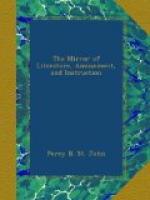[We quoted Contarini Fleming in our last volume, but were silent on its character. It is purely metaphysical, and metaphysics, at this season, may be “like pork in the dog-days;” but there are certain portions which strike out ideas so forcibly, and illustrate the communia of life with such vigour, as to tempt any lounging reader. Contarini is stated to be Mr. D’Israeli, the younger—Vivian Grey and the Young Duke,—with much more of the crust and wing of age and experience than was found in either of the fashionable novels. The real charm of Contarini is in its abstractedness, and consists in being pleased and puzzled at the same moment. The embellishment which the playful genius of the writer has gracefully, not tawdrily, thrown over his pages will attract, but the main purpose and merit of the work lies in its undercurrents, or, rather it would consist in this feature if the judgment of the writer were still more matured. Perhaps Mr. D’Israeli, who began the world of letters as a writer of fashionable novels, may leave us a work on metaphysics.
In the opening chapter of Contarini Fleming, Mr. D’Israeli explains his object as follows:—]
I am desirous of writing a book which shall be all truth, a work of which the passion, the thought, the action, and even the style, should spring from my own experience of feeling, from the meditations of my own intellect, from my own observation of incident, from my own study of the genius of expression.
[We can only admit a passage which appears to us to contain much world-knowledge and wholesome experience—what half the coroneted heads in Europe lack most lamentably. It is the advice tendered to Contarini by his father, previous to the youth of promise repairing to the University:]
I wish you to mix as much as is convenient with society. I apprehend that you have, perhaps, hitherto indulged a little too much in lonely habits. Young men are apt to get a little abstracted, and occasionally to think that there is something singular in their nature, when the fact is, if they were better acquainted with their fellow creatures, they would find they were mistaken. This is a common error, indeed the commonest. I am not at all surprised that you have fallen into it. All have. The most practical business-like men that exist have many of them, when children, conceived themselves totally disqualified to struggle in the world. You may rest assured of this. I could mention many remarkable instances. All persons, when young, are fond of solitude, and, when they are beginning to think, are sometimes surprised at their own thoughts. There is nothing to be deplored, scarcely to be feared, in this. It almost always wears off; but sometimes it happens, that they have not judicious friends by them to explain, that the habits which they think peculiar are universal, and, if unreasonably indulged, can ultimately only turn them into indolent, insignificant members of society, and occasion them lasting unhappiness.




